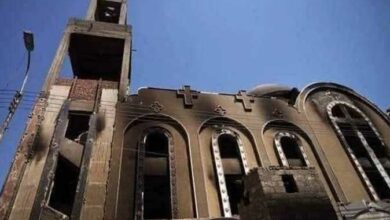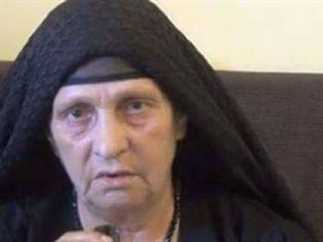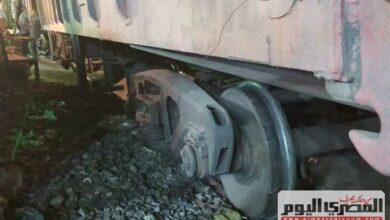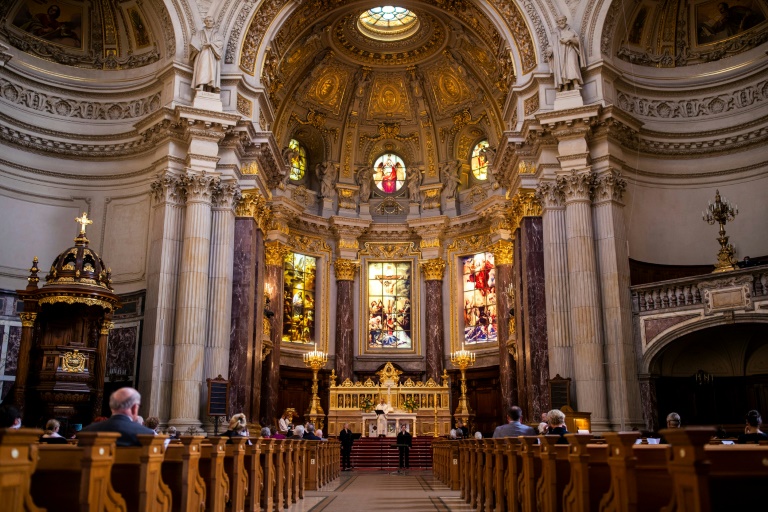ALEXANDRIA ― The Qedeseen Church complex was filled with noisy activity last Friday. A sonorously intoned prayer floated out of the church into the reception area, where worshippers filed in and out the main door as children scuttled between them.
It was an ordinary scene apart from the metal detector at the door, the CCTV camera monitoring everything and the 2012 wall calendar in the hand of one child, adorned with the faces of 20 martyrs.
Their images are everywhere in the church, smiling in their ekleel, gold crowns superimposed on their images and awarded in martyrdom. They are remembered in the memorial prayers held on Friday as outside repairs to the church building are still being carried out, a year after it was bombed on New Year's Eve.
In the church’s magazine a priest writes, “Everything Egypt is currently experiencing is a result of the explosion that took place in our church … it was the first spark that set off the 25 January 2011 explosion.”
The bombing of the Qedeseen Church at 12:20 am on 1 January 2011 brought full circle a torrid year for Egypt’s Orthodox Christians, which began on 6 January 2010 ― Christmas Eve for Copts ― with the deaths of six churchgoers and a Muslim guard, all shot dead outside a church in Nagaa Hammadi in Qena Governorate.
Fekry Naguib Nashed lost his two daughters, Mariam, 22, and Martina, 12, that day, as well as his wife Sonia Suleiman and sister-in-law Samira Suleiman.
Nashed left the memorial service on Friday to briefly recount the events of that night, calmly and methodically describing walking down from the church’s upper floor to find Martina’s body first, and then his wife’s some meters away.
Mariam’s body was discovered later, in a hospital along with Samira’s, whose face was almost unrecognizable.
“I talk about them as if they’re still alive,” Nashed said.
Nashed described the scene at the funeral, the furious outburst of chants against then-President Hosni Mubarak when a priest thanked state authorities, and the silencing of the governor of Alexandria by angry mourners when he tried to speak ― an unusual display of dissent in an institution that had rarely challenged the government.
The Qedeseen bombing sparked clashes of a kind Cairo hadn’t witnessed for years between furious Christian protesters and security forces. Less than 20 days later, all of Egypt erupted.
That searing anger from the first few days of January has been rekindled many times since.
Barely two weeks after Mubarak’s departure, the army attacked the St. Boula monastery near the Red Sea, demolishing a wall erected following a series of attacks on the monastery. Reportedly, prisoners who had escaped during the chaotic first days of the 25 January revolution were behind the initial attack.
A video on YouTube purportedly shows soldiers throwing stones at the building. What sounds like gunfire is audible.
The incident was telling: A link between the heavy-handed and discriminatory policies adopted by the Mubarak regime toward Christian places of worship, and a harbinger of the violence that the ruling Supreme Council of the Armed Forces (SCAF) would use against dissent in the coming months.
It is this mixture of all the worst aspects of the Mubarak regime’s formula for dealing with sectarian issues with an occasionally frenzied violent response that has characterized the SCAF’s handling of sectarian incidents since it took power.
In May, crowds surrounded a church in Imbaba, a neighborhood in Cairo, in response to a rumor that a Christian woman who had converted to Islam was being held inside. The crowd soon swelled and began to clash with local residents.
The army was apparently unable to contain the violence despite being present at the scene soon after it erupted, and despite its willing use of force in other contexts to “control” crowds ― such as its violent attack on Coptic protesters who refused to leave a sit-in outside the Maspero state television building on 14 May 2011.
What had prompted the May Maspero sit-in ― as well as a sit-in in March 2011 after an attack on a church in Atfeeh, Giza ― was the sense that nothing had changed.
Protesters in May expressed frustration that churches continue to be easy targets for religious extremists who are almost never held to account. In the Mubarak era, authorities preferred using “reconciliation sessions” between Muslims and Christians to courts in response to sectarian incidents, apparently in the belief that prosecuting perpetrators would inflame tensions. The result was impunity for wrongdoers and continued attacks.
And on the evening of 9 October 2011, it was the victims of an unimaginable crime committed by the military who found themselves in prison cells.
Christian protesters marched from the Cairo neighborhood of Shubra to the Maspero building following another attack on a church, this time in Aswan at the beginning of October.
They were met with live ammunition and armored personnel carriers (APCs) that deliberately mowed into them, killing 27 people, mostly Copts.
Scores were detained. One of them was 32-year-old father of two Girgis Abdel Sayyed, who had gone to the aftermath of the march to help the wounded.
Abdel Sayyed said he was taken into the Maspero building itself and held in a room with other detainees for hours. All were beaten and hit with electric sticks by soldiers who told them that they were infidels with filthy blood, and that they “killed soldiers.”
At some point in the night soldiers switched on the mobile phone they had taken from Abdel Sayyed and used it to call the last numbers he had last dialed ― those of his wife and cousin ― and inform them that he had been “cut up,” and that they wouldn’t see him again.
Under the impression that he was dead, his father and brother spent the whole night searching for his body in morgues. Abdel Sayyed spent 68 days in prison on charges relating to the events at Maspero before he and 26 others were released on bail.
Abdel Sayyed was almost impossibly sanguine as he recounted his experience, saying, “I’m not optimistic, but I still have hope.”
This feeling was echoed by Berlanty Kamal, mother of 17-year-old Peter Samy, who was also killed in the Qedeseen bombing.
Kamal spoke to Egypt Independent in her apartment, a five-minute walk from the church. She was at home when she heard the explosion, ten minutes after her son told her he was there on the telephone.
With a picture of her son with a black band of mourning on one corner above her, Kamal recounted how before Samy went out that evening he had spoken warmly about Egypt to his sister after she had asked him why he was wearing a sweater with the Egyptian flag on it.
“How could he love his country this much when it’s the same country that killed him? Egypt did this to him. Egypt isn’t a country, Egypt is made up of its people. No one came from abroad to kill him,” Kamal said.
Kamal strongly believes that God meant this for her son, and that had he lived, there is nothing he could have done that would have been as glorious as his martyrdom.
Kamal’s faith seems to have lent sense and order to the cruel mayhem she has endured. It also gives her strength in the face of an unknown future, with Islamists winning the first two rounds of Egypt's parliamentary elections. Is she afraid of what might lie in store for Egypt’s Copts?
“Can they do anything without God allowing it to happen? What can happen to me more than has happened? What can they do to me? All they can do is kill us ― and we’ll go to heaven,” Kamal said.
Several of Qedeseen's living victims share Kamal's confidence, such as 22-year-old student Hany Waguih, on crutches since the bombing and scheduled to fly abroad soon for treatment for his damaged inner ear, or Nashed, coming to terms with the loss of his entire family, and who spoke about the memorial service for his dead loved ones as a “celebration.”
“It’s not the Salafis or the Muslim Brotherhood or even the state that will protect Christians ― the state wasn’t able to protect Christians during the Mubarak era, was it?” he asked. “Only God can protect us.”




